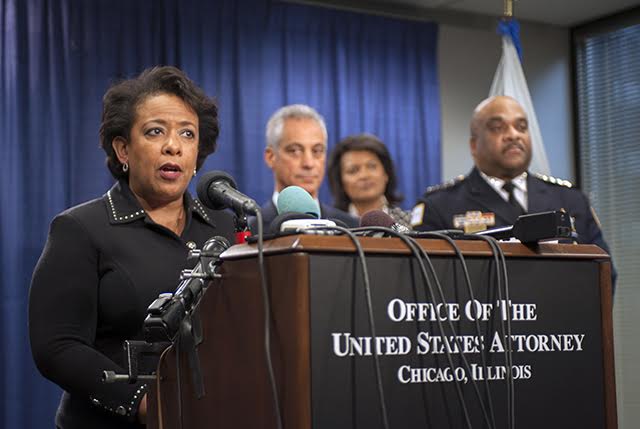'Fast, Sloppy' Police Training Detailed In Alarming DOJ Report
By Stephen Gossett in News on Jan 13, 2017 10:21PM

Attorney General Loretta Lynch (speaking) / Photo: Aaron Cynic
Given the Chicago Police Department's history of stormy race relations and a succession of ineffective oversight agencies, the Department of Justice's conclusions that racial discrimination and lack of police accountability fuel unconstitutional misconduct may not have surprised some. But the report's portrait of a deeply flawed training apparatus sheds light on a comparatively less-publicized aspect of the department's reported systemic deficiencies. The police department's training programs, the DOJ found, are an understaffed, frequently out-of-date, incomplete, and at times perfunctory patchwork.
Many people, from rookie patrolmen all the way up to the city's top cop, agree that current training is insufficient, the report states.
One of the most alarming instances documented outlines a deadly-force class in which officers were shown a video made 35 years prior. Because it was so old, subsequent Supreme Court rulings about use of force were never mentioned. After the video was over, the instructor never expounded on what situations legally justify use of force.
"In fact, the instructor arrived to the class ten minutes late and dismissed students twenty minutes early from this critical class on how CPD officers should use deadly force," the report states.
The department's reliance on videotape sessions and PowerPoint presentations in lieu of more hands-on, real-world field training is a key problem, according to the report. One supervisor characterized such methods as "check-the-box."
Training practices, generally speaking, "was fast, sloppy, and it’s getting people in trouble," another supervisor told investigators.
The department's methods for post-training evaluation didn't fare much better. The system is reportedly so damaged that the department fails to properly determine when an officer needs additional training and when he or she should be dismissed from duty.
Another major training blind spot was its Field Training Program. "The selection process"—to become a Field Training Officer—"knowingly discourages many of the most-qualified officers from serving... allows problematic police officers to continue acting as FTOs," according to the report. Field Training Officers therefore become little more than “warm butts in a seat," as a supervisor said, according to the report.
Officers are given precious little worthwhile training after they graduate the Academy, also. Rather than the recommended "live, regular annual training," officers get little more than additional perfunctory videos at morning roll call or online modules "One officer summarized CPD’s entire post-Academy training program as 'Watch a Video,'" the report states.
It continues:
The impact of the lack of in-service training cannot be overstated. Without regular, mandatory training, CPD officers do not receive ongoing instruction on critically important topics, such as proper use of force, responding to persons in mental health crisis, handling domestic violence calls, or updates in the law regarding stops and searches. This prevents officers from accepting and emulating a culture of constitutional and fair policing. It also inhibits officer confidence that they know how to do their jobs safely and effectively
Regular refresher training on use of force, including deadly force, is non-existent.
At a minimum, generally accepted police practices dictate at least 40 hours of continuing education per year, which usually includes roughly 24 hours of skills. Not only did officers not receive the recommended annual 24 hours of force-refresher training, "several CPD officers reported to us that, once they left the Academy, they were not required to retrain on any basic skills." The report describes one officer's never-realized struggle to secure Taser training. "[T]he City’s lack of preparation is now our emergency.," he told the probe.
It follows that review of use-of-force incidents found "CPD officers engaging in dangerous tactics that indicate they do not remember or were never taught basic police skills."
One of the most glaring revelations shows another top-down failure: the department has no protocol for foot pursuits. "CPD has long had detailed policies regarding vehicle pursuits," the report notes. "It does not have a foot pursuit policy. It should. In addition to not having a policy, CPD has not taken corrective action to address problematic foot pursuits. This puts officers and the public in danger and results in unreasonable uses of force."
As the DOJ's nutshell encapsulation states:
CPD’s overall lack of planning results in training that is ad hoc, disorganized, and reactive to the most recent crisis, rather than thoughtful, proactive, and demonstrably responsive to officers’ training needs.